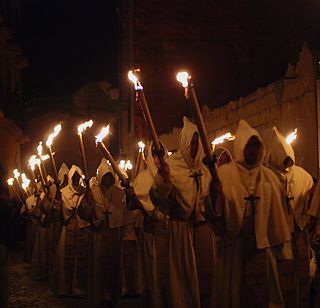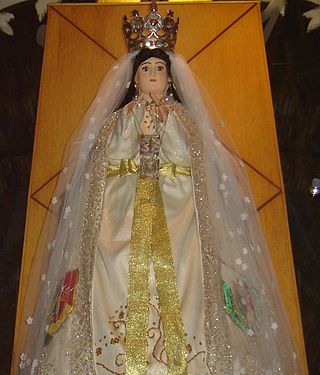
Alfonso X was King of Castile, León and Galicia from 1 June 1252 until his death in 1284. During the election of 1257, a dissident faction chose him to be king of Germany on 1 April. He renounced his claim to Germany in 1275, and in creating an alliance with the Kingdom of England in 1254, his claim on the Duchy of Gascony as well.

María de la Concepción Jesusa Basilisa Rodríguez-Espina y García-Tagle, short form Concha Espina, was a Spanish writer. She was nominated for a Nobel prize in literature 25 times in 28 years.

Aranda de Duero is a city and municipality, capital of the Ribera del Duero comarca, in the south of the province of Burgos, in Castile and León, Spain. It has a population of roughly 33,000 people and lies on the River Duero.

Alberto Vázquez-Figueroa is a Spanish novelist, inventor and industrialist. His novels have sold over 25 million copies worldwide. He is the owner of A.V.F.S.L, a desalinization company that uses a method of desalinization by pressure, invented by himself.

Holy Week in Zamora, Spain, is the annual commemoration of the Passion of Jesus Christ that takes place during the last week of Lent, the week immediately before Easter. Holy Week is the Christian week from Palm Sunday through Easter Sunday. It can take place in March or April. In Zamora, Holy Week is celebrated by 16 Catholic religious brotherhoods and fraternities that perform penance processions on the streets of the city.

The Cusco school or Cuzco school, was a Roman Catholic artistic tradition based in Cusco, Peru during the Colonial period, in the 16th, 17th and 18th centuries. It was not limited to Cusco only, but spread to other cities in the Andes, as well as to present day Ecuador and Bolivia.

Alcabón is a municipality located in the province of Toledo, Castile-La Mancha, Spain. According to the 2022 census (INE), the municipality had a population of 743 inhabitants.

Portrait in Sepia is a 2000 novel by Isabel Allende. The novel can be thought of a sequel to Allende's Daughter of Fortune as it follows Eliza Sommers' granddaughter - Aurora del Valle.

The Virgin of Candelaria or Our Lady of Candelaria, popularly called La Morenita, celebrates the Virgin Mary on the island of Tenerife, one of the Canary Islands (Spain). The center of worship is located in the city of Candelaria in Tenerife. She is depicted as a Black Madonna. The "Royal Basilica Marian Shrine of Our Lady of Candelaria" is considered the main church dedicated to the Virgin Mary in the Canary Islands and she is the patroness saint of the Canary Islands. Her feast is celebrated on February 2 and August 15, the patronal feast of the Canary Islands.

"Bajada" is the shortened version of the Fiestas de la Bajada which is a festival which takes place in several places in the Canary Islands. Bajada is Spanish for "bringing down", and means the bringing of a patron saint's statue from its normal place in a chapel to be celebrated by the people.

Red UNO de Bolivia is a national Bolivian television network owned by conservative businessman Ivo Kuljis, a businessman of Croatian origin, who also owns other interests outside of media. It started operations in April 1984 in Santa Cruz and in 1985 in La Paz. Its most notable programming is Notivisión (news) and "El Mañanero ". It also maintains affiliation deals with three channels in Potosí, Sucre and Tarija.

Cotoca is a canton and Municipality of Andrés Ibáñez Province in Santa Cruz Department, Bolivia. The municipality consists of two cantons – Cotoca itself and Puerto Pailas. In 2010 it had an estimated population of 23,951 for the canton and 56,451 for the municipality.

The Virgin of El Rocío is a small carved wooden statue of the Virgin and Child, of which the only carved parts are the face, hands, and the Christ child, which is venerated at the Hermitage of El Rocío. The associated annual procession/pilgrimage, known as the Romería de El Rocío, draws roughly a million people each year.

The Virgen de Cotoca is the patron saint for the Department of Santa Cruz, Bolivia. Her image is located in a shrine built in her honor and located in the City of Cotoca in the Department of Santa Cruz, Bolivia. The Virgin of Cotoca is venerated by thousands of Bolivians who ask for her intercession for blessings and other petitions.

Juana de la Cruz Vázquez y Gutiérrez, TOR,, was a Spanish abbess of the Franciscan Third Order Regular. Known to be a mystic, she was authorized to preach publicly, an extraordinary permission for a woman. Living at the start of Spanish mysticism's golden era, she is counted among Teresa of Ávila's literary mothers. In 2015 she was declared Venerable by the Catholic Church.

Adriana Salvatierra Arriaza is a Bolivian political scientist and politician who served as president of the Senate in 2019. A member of the Movement for Socialism, she served as senator for Santa Cruz from 2015 to 2020 and was a substitute senator for Santa Cruz under Carlos Romero in 2015. At age twenty-nine, Salvatierra was the youngest legislator and third woman to hold the presidency of the Senate and was the youngest individual to ever exert presidential authority, albeit briefly in an acting capacity.
The 2020 Bolivian Primera División season, known as the 2020 Copa Tigo season for sponsorship reasons, was the 43rd season of the División Profesional del Fútbol Boliviano, Bolivia's top-flight football league and the third season under División de Fútbol Profesional management. The season started on 21 January 2020 and ended on 31 December 2020. Jorge Wilstermann were the defending champions, having won the 2019 Clausura tournament.
The following is a chronology of notable events from the year 2023 in Bolivia.
Héctor Manuel Cuéllar Rosales is a Bolivian professional footballer who plays as a midfielder for Club Always Ready and the Bolivia national team.
















